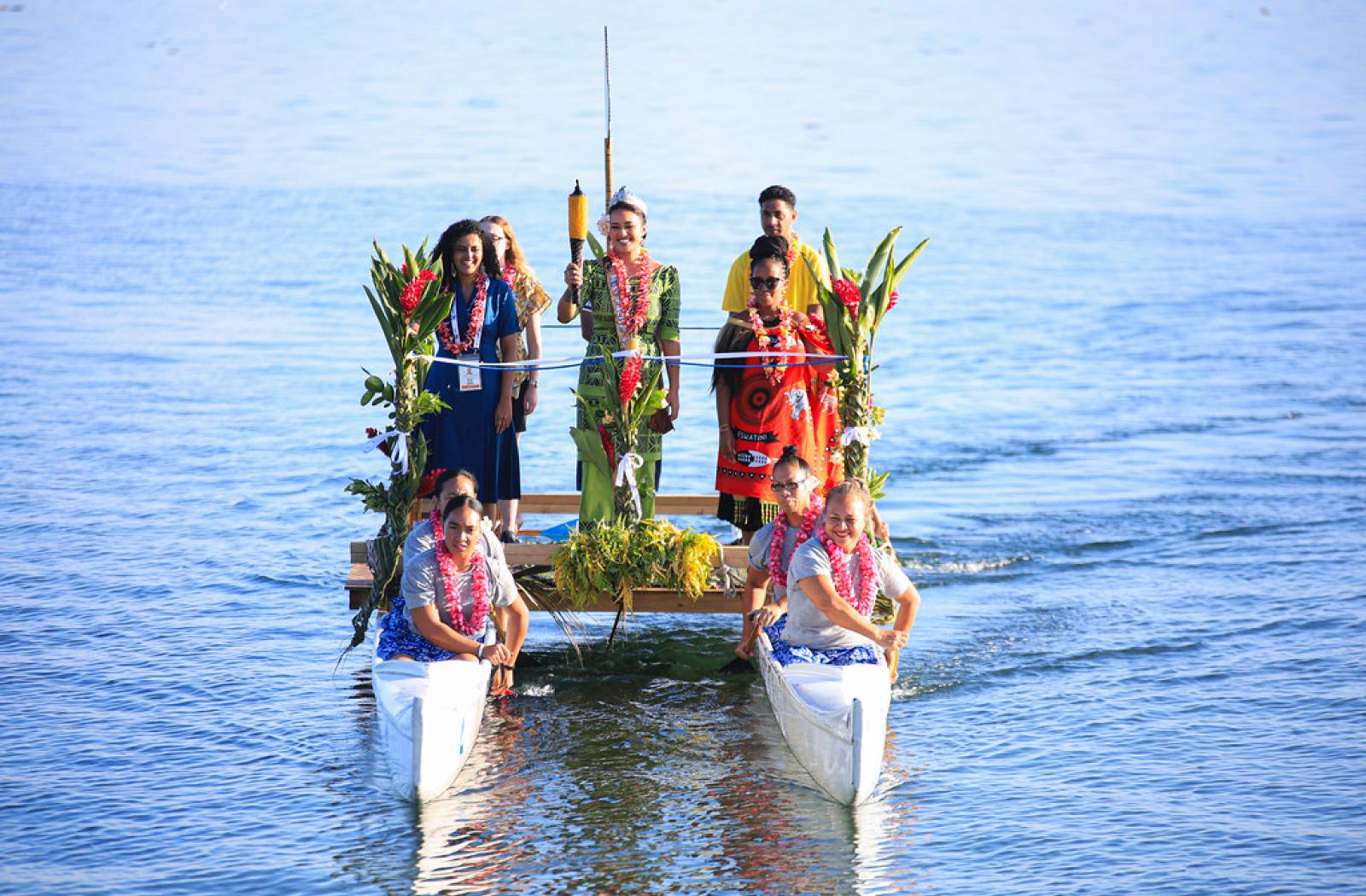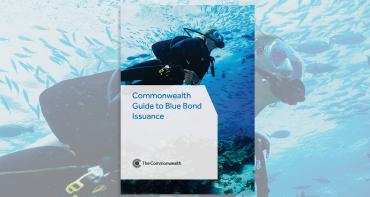Commonwealth countries today adopted the Apia Commonwealth Ocean Declaration for One Resilient Common Future, which calls on all 56 Commonwealth nations to protect and restore the ocean in the face of severe climate change, pollution and impacts related to over-exploitation.

The declaration, agreed at the Commonwealth Heads of Government Meeting (CHOGM) in Samoa, paves the way for robust, ambitious, innovative and transformative action for a Common Wealth of shared ocean prosperity, resilience and sustainability that builds on national and collective efforts to protect the ocean and use it sustainably.
Key aspects of the declaration include:
- recognition of national maritime boundaries in the face of sea-level rise
- protection of at least 30 per cent of the ocean and restoring at least 30 per cent of degraded marine ecosystems by 2030
- urgent finalisation of the Global Plastics Treaty
- ratification of the high-seas biodiversity Agreement on Marine Biodiversity in Areas Beyond National Jurisdiction (known as the BBNJ Agreement or 'High Seas' Treaty)
- development and implementation of coastal climate adaption plans and strategies, including vulnerability assessments and nature-based solutions, such as blue carbon
- stepped up support for a sustainable blue economy with sustainable ocean plans, recognising the need for 100 per cent management of national waters
- reduction of emissions from global maritime shipping
- enhanced marine renewable energy targets to meet the global climate goal of tripling renewable energy capacity, agreed as part of the UNFCCC Global Stocktake in Dubai last year.
The Prime Minister of Samoa, the Hon. Fiame Naomi Mata’afa, welcomed the agreement, saying:
“It is fitting that our first ocean declaration is adopted in the Blue Pacific continent given climate change has been recognised as the single greatest threat to the security and well-being of our people. The ocean makes up 96 per cent of our region; and where we are amongst the first to most immediately suffer the impacts of climate change.
“The Apia Commonwealth Ocean Declaration for One Resilient Common Future must be a line in the sand from which the world collectively transforms ocean exploitation into protection and sustainable stewardship. We look forward to moving from words to action!”
The Commonwealth Secretary-General, the Rt Hon. Patricia Scotland KC, noted:
“The incredible progress we have made with the Blue Charter that underpins this declaration helps member states rise to today's climate challenges and seize tomorrow's opportunities. I am confident that this declaration will have a profound and durable impact on the well-being of our people, ocean and planet.
“This document now sets the standard for forthcoming international meetings, generating momentum for ocean protection as we head towards COP29 in Azerbaijan in November, and next year’s UN Ocean Conference. We are immensely proud of this achievement and will leave no one behind as we advocate for stronger ocean protection.”
The Apia Commonwealth Ocean Declaration for One Resilient Common Future is the culmination of many years of visionary and collective action. In 2018, Commonwealth leaders agreed to work together towards a sustainable ocean through the adoption of the Commonwealth Blue Charter. Since then, 17 champion countries have led 10 Action Groups covering marine protection, sustainable blue economies, climate change and ocean pollution. These action groups will now play a pivotal role in implementing the declaration.
At the 2022 CHOGM in Rwanda, Governments called for a Commonwealth Ocean Declaration. In April 2024, countries agreed on the priorities for the Ocean Declaration at the first-ever Commonwealth Ocean Ministers Meeting in Cyprus.
The Commonwealth represents a third of the world’s population, and 49 of its 56 countries have a coastline. Crucially, 25 Commonwealth nations are Small Island Developing States (SIDS), increasingly impacted by climate change, sea level rise, rising temperatures and increasing ocean acidity – impacting sea life, ecosystems and the communities that depend upon them.
Read the full Apia Commonwealth Ocean Declaration for One Resilient Common Future (PDF)
The Commonwealth & the Ocean: Facts and figures
- 49 out of 56 Commonwealth members have ocean borders.
- The Commonwealth covers more than a third of the world's ocean under national jurisdiction (36 per cent) and about 45 per cent of the world’s coral reefs.
- 25 of 33 Commonwealth small states are small island developing states (SIDS), or ‘Large Ocean States’. They make up two thirds of the world’s SIDS.
- Pacific Islands are large ocean states: on average 96 per cent of Pacific Island Countries are ocean, 4 per cent land. In Kiribati, for example, atolls and islands occupy 811 square kilometres, lying within an ocean domain of 3.5 million square kilometres – about the width of the continental USA – which mean that it has 4,000 times more ocean than land.
- Pacific fishing and tourism provide US$3.3 billion to the national economies of Pacific countries and territories.
Summary of relevant Commonwealth programmes
- Commonwealth Blue Charter: An agreement by all 56 Commonwealth countries adopted at the 2018 CHOGM to actively cooperate to solve ocean-related challenges and meet commitments for sustainable ocean development, with emphasis on the UN Sustainable Development Goals (SDGs), especially SDG 14 (Life Below Water). The Blue Charter is implemented through member-driven Action Groups, led by 17 ‘Champion countries’, with the support of the Commonwealth Secretariat. To date, 47 countries have joined one or more of the Action Groups.
- Commonwealth Climate Finance Access Hub: The CCFAH helps Commonwealth small and other vulnerable states access funding for climate projects by embedding highly skilled long-term national and regional advisers in relevant government departments to build capacity. CCFAH has assisted countries, to secure around US$365 million in climate finance, with a robust project pipeline worth over US$500 million. The programme also trained 2,500 government officials trained on various aspects of climate finance.
- Commonwealth Living Land Charter: The Commonwealth Living Lands Charter: A Commonwealth Call to action on Living Lands (CALL), commits all 56 member countries to safeguarding global land resources while taking coordinated action on climate change, biodiversity loss and sustainable land management.
- Commonwealth Toolkit for Clean Energy Investment Business Case for SIDS: Developed in partnership with SEforALL and launched at COP26, this toolkit helps SIDS to formulate business cases that quantify the investment required to meet a country’s renewable energy and net zero targets. Two pilot business cases have been developed for Seychelles and Barbados and we would welcome opportunities to develop business cases for Pacific SIDS and facilitate an investor roundtable to launch the business cases.
Notes to Editors
- The Commonwealth is a voluntary association of 56 independent and equal sovereign states. Our combined population is 2.7 billion, of which more than 60 per cent is aged 29 or under.
- The Commonwealth spans the globe and includes both advanced economies and developing countries. Thirty-three of our members are small states, many of which are island nations.
- The Commonwealth Secretariat supports member countries to build democratic and inclusive institutions, strengthen governance and promote justice and human rights. Our work helps to grow economies and boost trade, deliver national resilience, empower young people and address threats such as climate change, debt and inequality.
- Member countries are supported by a network of more than 80 intergovernmental, civil society, cultural and professional organisations.
- For more information and regular updates about Commonwealth activities and initiatives, subscribe to our monthly newsletter and follow our new WhatsApp channel.
Media Contact
CHOGM Communications Team
Commonwealth Secretariat
Tel: + 44 7894 593508
Email: [email protected]


